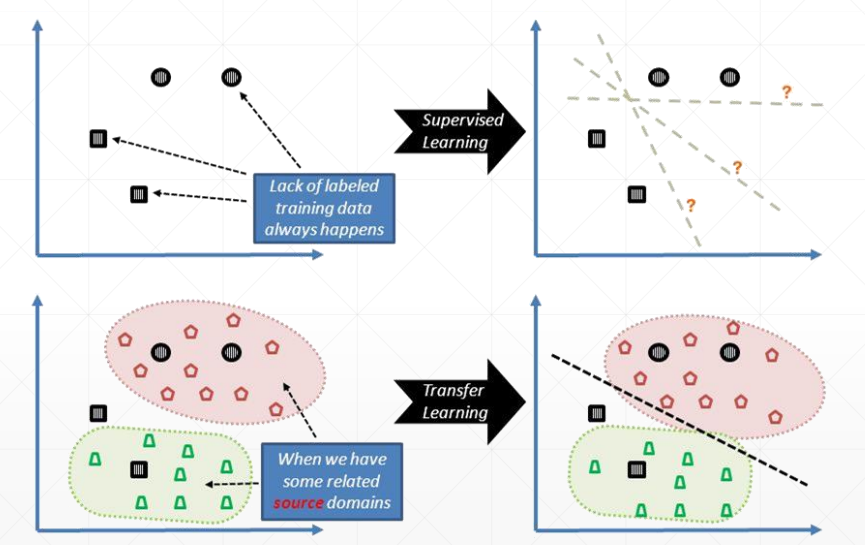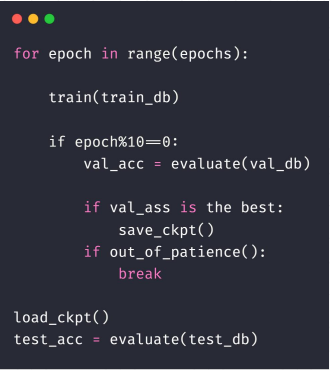| title | math | date | categories | tags | ||||
|---|---|---|---|---|---|---|---|---|
PyTorch学习笔记(8)迁移学习实战 |
true |
2023-07-19 14:53:00 -0700 |
|
|
迁移学习可以通过小数据量样本对模型进行微调,达到针对小数据量数据集更好的拟合效果
import torch
import os, glob
import random, csv
from torch.utils.data import Dataset, DataLoader
from torchvision import transforms
from PIL import Image
class Pokemon(Dataset):
def __init__(self, root, resize, mode):
super(Pokemon, self).__init__()
self.root = root
self.resize = resize
self.name2label = {} # "sq...":0
for name in sorted(os.listdir(os.path.join(root))):
if not os.path.isdir(os.path.join(root, name)):
continue
self.name2label[name] = len(self.name2label.keys())
# print(self.name2label)
# image, label
self.images, self.labels = self.load_csv('images.csv')
if mode=='train': # 60%
self.images = self.images[:int(0.6*len(self.images))]
self.labels = self.labels[:int(0.6*len(self.labels))]
elif mode=='val': # 20% = 60%->80%
self.images = self.images[int(0.6*len(self.images)):int(0.8*len(self.images))]
self.labels = self.labels[int(0.6*len(self.labels)):int(0.8*len(self.labels))]
else: # 20% = 80%->100%
self.images = self.images[int(0.8*len(self.images)):]
self.labels = self.labels[int(0.8*len(self.labels)):]
def load_csv(self, filename):
if not os.path.exists(os.path.join(self.root, filename)):
images = []
for name in self.name2label.keys():
# 'pokemon\\mewtwo\\00001.png
images += glob.glob(os.path.join(self.root, name, '*.png'))
images += glob.glob(os.path.join(self.root, name, '*.jpg'))
images += glob.glob(os.path.join(self.root, name, '*.jpeg'))
# 1167, 'pokemon\\bulbasaur\\00000000.png'
print(len(images), images)
random.shuffle(images)
with open(os.path.join(self.root, filename), mode='w', newline='') as f:
writer = csv.writer(f)
for img in images: # 'pokemon\\bulbasaur\\00000000.png'
name = img.split(os.sep)[-2]
label = self.name2label[name]
# 'pokemon\\bulbasaur\\00000000.png', 0
writer.writerow([img, label])
print('writen into csv file:', filename)
# read from csv file
images, labels = [], []
with open(os.path.join(self.root, filename)) as f:
reader = csv.reader(f)
for row in reader:
# 'pokemon\\bulbasaur\\00000000.png', 0
img, label = row
label = int(label)
images.append(img)
labels.append(label)
assert len(images) == len(labels)
return images, labels
def __len__(self):
return len(self.images)
def denormalize(self, x_hat):
mean = [0.485, 0.456, 0.406]
std = [0.229, 0.224, 0.225]
# x_hat = (x-mean)/std
# x = x_hat*std = mean
# x: [c, h, w]
# mean: [3] => [3, 1, 1]
mean = torch.tensor(mean).unsqueeze(1).unsqueeze(1)
std = torch.tensor(std).unsqueeze(1).unsqueeze(1)
# print(mean.shape, std.shape)
x = x_hat * std + mean
return x
def __getitem__(self, idx):
# idx~[0~len(images)]
# self.images, self.labels
# img: 'pokemon\\bulbasaur\\00000000.png'
# label: 0
img, label = self.images[idx], self.labels[idx]
tf = transforms.Compose([
lambda x:Image.open(x).convert('RGB'), # string path= > image data
transforms.Resize((int(self.resize*1.25), int(self.resize*1.25))),
transforms.RandomRotation(15),
transforms.CenterCrop(self.resize),
transforms.ToTensor(),
transforms.Normalize(mean=[0.485, 0.456, 0.406],
std=[0.229, 0.224, 0.225])
])
img = tf(img)
label = torch.tensor(label)
return img, label
def main():
import visdom
import time
import torchvision
viz = visdom.Visdom()
# tf = transforms.Compose([
# transforms.Resize((64,64)),
# transforms.ToTensor(),
# ])
# db = torchvision.datasets.ImageFolder(root='pokemon', transform=tf)
# loader = DataLoader(db, batch_size=32, shuffle=True)
#
# print(db.class_to_idx)
#
# for x,y in loader:
# viz.images(x, nrow=8, win='batch', opts=dict(title='batch'))
# viz.text(str(y.numpy()), win='label', opts=dict(title='batch-y'))
#
# time.sleep(10)
db = Pokemon('pokemon', 64, 'train')
x,y = next(iter(db))
print('sample:', x.shape, y.shape, y)
viz.image(db.denormalize(x), win='sample_x', opts=dict(title='sample_x'))
loader = DataLoader(db, batch_size=32, shuffle=True, num_workers=8)
for x,y in loader:
viz.images(db.denormalize(x), nrow=8, win='batch', opts=dict(title='batch'))
viz.text(str(y.numpy()), win='label', opts=dict(title='batch-y'))
time.sleep(10)
if __name__ == '__main__':
main()import torch
from torch import nn
from torch.nn import functional as F
class ResBlk(nn.Module):
"""
resnet block
"""
def __init__(self, ch_in, ch_out, stride=1):
"""
:param ch_in:
:param ch_out:
"""
super(ResBlk, self).__init__()
self.conv1 = nn.Conv2d(ch_in, ch_out, kernel_size=3, stride=stride, padding=1)
self.bn1 = nn.BatchNorm2d(ch_out)
self.conv2 = nn.Conv2d(ch_out, ch_out, kernel_size=3, stride=1, padding=1)
self.bn2 = nn.BatchNorm2d(ch_out)
self.extra = nn.Sequential()
if ch_out != ch_in:
# [b, ch_in, h, w] => [b, ch_out, h, w]
self.extra = nn.Sequential(
nn.Conv2d(ch_in, ch_out, kernel_size=1, stride=stride),
nn.BatchNorm2d(ch_out)
)
def forward(self, x):
"""
:param x: [b, ch, h, w]
:return:
"""
out = F.relu(self.bn1(self.conv1(x)))
out = self.bn2(self.conv2(out))
# short cut.
# extra module: [b, ch_in, h, w] => [b, ch_out, h, w]
# element-wise add:
out = self.extra(x) + out
out = F.relu(out)
return out
class ResNet18(nn.Module):
def __init__(self, num_class):
super(ResNet18, self).__init__()
self.conv1 = nn.Sequential(
nn.Conv2d(3, 16, kernel_size=3, stride=3, padding=0),
nn.BatchNorm2d(16)
)
# followed 4 blocks
# [b, 16, h, w] => [b, 32, h ,w]
self.blk1 = ResBlk(16, 32, stride=3)
# [b, 32, h, w] => [b, 64, h, w]
self.blk2 = ResBlk(32, 64, stride=3)
# # [b, 64, h, w] => [b, 128, h, w]
self.blk3 = ResBlk(64, 128, stride=2)
# # [b, 128, h, w] => [b, 256, h, w]
self.blk4 = ResBlk(128, 256, stride=2)
# [b, 256, 7, 7]
self.outlayer = nn.Linear(256*3*3, num_class)
def forward(self, x):
"""
:param x:
:return:
"""
x = F.relu(self.conv1(x))
# [b, 64, h, w] => [b, 1024, h, w]
x = self.blk1(x)
x = self.blk2(x)
x = self.blk3(x)
x = self.blk4(x)
# print(x.shape)
x = x.view(x.size(0), -1)
x = self.outlayer(x)
return x
def main():
blk = ResBlk(64, 128)
tmp = torch.randn(2, 64, 224, 224)
out = blk(tmp)
print('block:', out.shape)
model = ResNet18(5)
tmp = torch.randn(2, 3, 224, 224)
out = model(tmp)
print('resnet:', out.shape)
p = sum(map(lambda p:p.numel(), model.parameters()))
print('parameters size:', p)
if __name__ == '__main__':
main()import torch
from torch import optim, nn
import visdom
import torchvision
from torch.utils.data import DataLoader
from pokemon import Pokemon
from resnet import ResNet18
batchsz = 32
lr = 1e-3
epochs = 10
device = torch.device('cuda')
torch.manual_seed(1234)
train_db = Pokemon('pokemon', 224, mode='train')
val_db = Pokemon('pokemon', 224, mode='val')
test_db = Pokemon('pokemon', 224, mode='test')
train_loader = DataLoader(train_db, batch_size=batchsz, shuffle=True,
num_workers=4)
val_loader = DataLoader(val_db, batch_size=batchsz, num_workers=2)
test_loader = DataLoader(test_db, batch_size=batchsz, num_workers=2)
viz = visdom.Visdom()
def evalute(model, loader):
model.eval()
correct = 0
total = len(loader.dataset)
for x,y in loader:
x,y = x.to(device), y.to(device)
with torch.no_grad():
logits = model(x)
pred = logits.argmax(dim=1)
correct += torch.eq(pred, y).sum().float().item()
return correct / total
def main():
model = ResNet18(5).to(device)
optimizer = optim.Adam(model.parameters(), lr=lr)
criteon = nn.CrossEntropyLoss()
best_acc, best_epoch = 0, 0
global_step = 0
viz.line([0], [-1], win='loss', opts=dict(title='loss'))
viz.line([0], [-1], win='val_acc', opts=dict(title='val_acc'))
for epoch in range(epochs):
for step, (x,y) in enumerate(train_loader):
# x: [b, 3, 224, 224], y: [b]
x, y = x.to(device), y.to(device)
model.train()
logits = model(x)
loss = criteon(logits, y)
optimizer.zero_grad()
loss.backward()
optimizer.step()
viz.line([loss.item()], [global_step], win='loss', update='append')
global_step += 1
if epoch % 1 == 0:
val_acc = evalute(model, val_loader)
if val_acc> best_acc:
best_epoch = epoch
best_acc = val_acc
torch.save(model.state_dict(), 'best.mdl')
viz.line([val_acc], [global_step], win='val_acc', update='append')
print('best acc:', best_acc, 'best epoch:', best_epoch)
model.load_state_dict(torch.load('best.mdl'))
print('loaded from ckpt!')
test_acc = evalute(model, test_loader)
print('test acc:', test_acc)
if __name__ == '__main__':
main()import torch
from torch import optim, nn
import visdom
import torchvision
from torch.utils.data import DataLoader
from pokemon import Pokemon
# from resnet import ResNet18
from torchvision.models import resnet18
from utils import Flatten
batchsz = 32
lr = 1e-3
epochs = 10
device = torch.device('cuda')
torch.manual_seed(1234)
train_db = Pokemon('pokemon', 224, mode='train')
val_db = Pokemon('pokemon', 224, mode='val')
test_db = Pokemon('pokemon', 224, mode='test')
train_loader = DataLoader(train_db, batch_size=batchsz, shuffle=True,
num_workers=4)
val_loader = DataLoader(val_db, batch_size=batchsz, num_workers=2)
test_loader = DataLoader(test_db, batch_size=batchsz, num_workers=2)
viz = visdom.Visdom()
def evalute(model, loader):
model.eval()
correct = 0
total = len(loader.dataset)
for x,y in loader:
x,y = x.to(device), y.to(device)
with torch.no_grad():
logits = model(x)
pred = logits.argmax(dim=1)
correct += torch.eq(pred, y).sum().float().item()
return correct / total
def main():
# model = ResNet18(5).to(device)
trained_model = resnet18(pretrained=True)
model = nn.Sequential(*list(trained_model.children())[:-1], #[b, 512, 1, 1]
Flatten(), # [b, 512, 1, 1] => [b, 512]
nn.Linear(512, 5)
).to(device)
# x = torch.randn(2, 3, 224, 224)
# print(model(x).shape)
optimizer = optim.Adam(model.parameters(), lr=lr)
criteon = nn.CrossEntropyLoss()
best_acc, best_epoch = 0, 0
global_step = 0
viz.line([0], [-1], win='loss', opts=dict(title='loss'))
viz.line([0], [-1], win='val_acc', opts=dict(title='val_acc'))
for epoch in range(epochs):
for step, (x,y) in enumerate(train_loader):
# x: [b, 3, 224, 224], y: [b]
x, y = x.to(device), y.to(device)
model.train()
logits = model(x)
loss = criteon(logits, y)
optimizer.zero_grad()
loss.backward()
optimizer.step()
viz.line([loss.item()], [global_step], win='loss', update='append')
global_step += 1
if epoch % 1 == 0:
val_acc = evalute(model, val_loader)
if val_acc> best_acc:
best_epoch = epoch
best_acc = val_acc
torch.save(model.state_dict(), 'best.mdl')
viz.line([val_acc], [global_step], win='val_acc', update='append')
print('best acc:', best_acc, 'best epoch:', best_epoch)
model.load_state_dict(torch.load('best.mdl'))
print('loaded from ckpt!')
test_acc = evalute(model, test_loader)
print('test acc:', test_acc)
if __name__ == '__main__':
main()from matplotlib import pyplot as plt
import torch
from torch import nn
class Flatten(nn.Module):
def __init__(self):
super(Flatten, self).__init__()
def forward(self, x):
shape = torch.prod(torch.tensor(x.shape[1:])).item()
return x.view(-1, shape)
def plot_image(img, label, name):
fig = plt.figure()
for i in range(6):
plt.subplot(2, 3, i + 1)
plt.tight_layout()
plt.imshow(img[i][0]*0.3081+0.1307, cmap='gray', interpolation='none')
plt.title("{}: {}".format(name, label[i].item()))
plt.xticks([])
plt.yticks([])
plt.show()
